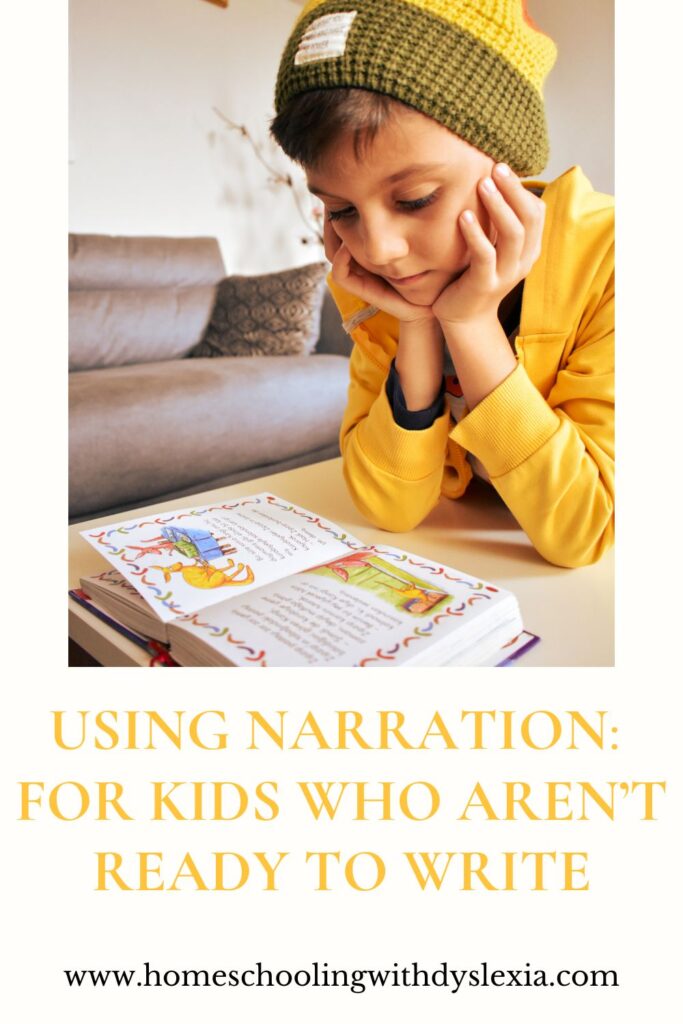Charlotte Mason, an English educator from the late 19th and early 20th centuries, left an enduring legacy in the field of education with her innovative and holistic approach. One of the key components of her philosophy is narration, a powerful technique for teaching children to engage with and internalize knowledge. In this blog post, we will explore what narration is according to Charlotte Mason, how to teach kids to narrate effectively, and why narration serves as an excellent introduction to composition, especially for students with dyslexia who learn to write later than neuro-typical students.

What is Narration According to Charlotte Mason?
Narration, in the context of Charlotte Mason’s educational philosophy, is the process of retelling or recounting what a child has read or heard in their own words. It is not mere regurgitation of facts but an active process that requires comprehension, attention, and the ability to articulate one’s thoughts coherently. Mason believed that narration is a natural and effective way for children to engage with and assimilate knowledge.
How to Teach Kids to Narrate Effectively
- Select Quality Literature: Charlotte Mason emphasized the importance of exposing children to living books—books written by authors who are passionate about their subjects and can convey that passion through their writing. Choose books that are age-appropriate and align with your child’s interests.
- Encourage Active Listening: Whether reading aloud to your child or having them read independently, encourage active listening or reading. Discuss the text as you go along, ask questions, and foster curiosity.
- Give Freedom in Expression: Allow your child to narrate in their own words without interrupting or correcting them immediately. This freedom of expression helps them develop their language skills and gain confidence in their ability to articulate thoughts.
- Vary Narration Formats: Charlotte Mason advocated for different forms of narration, including oral narration (speaking), written narration (writing), and even artistic narration (illustrating scenes or concepts from the text). By varying the formats, you cater to different learning styles and abilities.
- Gradually Increase Complexity: Start with shorter passages and gradually move to longer and more challenging texts as your child’s narration skills develop. This incremental approach ensures they are continually challenged and progressing.
Why Narration is a Precursor to Composition
- Comprehension: Narration forces children to understand and internalize what they read or hear. When they narrate, they must process information, synthesize it, and then articulate it in their own words. This deepens their comprehension.
- Vocabulary and Expression: Narration enhances vocabulary by requiring children to use words and phrases from the text. It also fosters the development of coherent and expressive language skills, which are essential for effective composition.
- Critical Thinking: By narrating, children learn to analyze and organize information logically. This critical thinking skill is crucial for constructing well-structured and persuasive essays or compositions.
- Confidence and Independence: As children become proficient in narration, they gain confidence in their ability to express themselves and their opinions. This self-assurance lays a strong foundation for future writing endeavors.
- Engagement and Ownership: Narration encourages children to engage with texts actively and take ownership of their learning. They become more attentive readers and thinkers, which is invaluable when it comes to generating original ideas for composition.
Charlotte Mason’s method of narration is a powerful tool in education that not only helps children engage with and internalize knowledge but also serves as an excellent precursor to composition. By implementing narration into your child’s educational journey, you can foster comprehension, vocabulary, critical thinking, confidence, and a genuine love for learning—all essential qualities for becoming a skilled and articulate writer. Embrace the art of narration, and you’ll be nurturing the writers and thinkers of tomorrow.





0 Comments